Franklin Vets
Franklin Vets - excellence in veterinary care for dairy, farming, lifestyle, equine and household pets. BESTPRACTICE ACCREDITED NZ.

The kid should be chosen no earlier than 3 days after birth but preferably 5 days. This allows the kid to have its mother’s colostrum, which gives protection against diseases and is high in both vitamins and minerals.
The kid should be chosen no earlier than three days after birth but preferably five days after birth. This allows the kid to have its mother’s colostrum in the first 12 hours of life, which gives protection against diseases and is a concentrated source of fat and protein to give them a good kickstart in life.
On occasion, kids have been rejected by their mother or are one of triplets, in which case one is removed from its mother as she is not able to adequately feed three of them. In these cases, the kid may not have received colostrum.
The healthy kid should have a dry small navel, lively movements, and clear bright eyes. If a buck (male) is chosen he should be castrated at 10 weeks old. This will be significantly more painful at this age, so should be done with a vet to numb the testicles and give long-acting pain relief. Castrating before 10 weeks old halts development of the urethra (the tube inside the penis that carries urine). The thin tube is more likely to block.
If kids are to be dehorned, they should be debudded by a vet at one - two weeks of age. Failure to do this at the correct age often results in horn re-growth. Dehorning of adult goats is not commonly performed as goats have unique skull anatomy that makes them very high risk.
Basic rearing requires:
All of these products are available at your local Franklin Vets clinic.

Goat kids should be fed colostrum for the first 2-3 days to boost their natural immune system.
A milk replacer such as AnLamb should be introduced after this. A kid goat will continue to drink as much as possible, but the most natural way they feed is little and often.
Lamb/goat teats that can be screwed onto a Coke or water bottle or complete lamb/goat feeding bottles are available from Franklin Vets.
Supplement the milk with a lamb or multifeed pellet and keep moving your goat so it has access to fresh grass every day.
If your kid is bright, happy and feeding but still has runny poo, check out this flyer for more info: Addressing dietary scours
Unfortunately, abomasal bloat kills up to 30% of bottle-fed kids before weaning. If feeding big feeds 2-3x/day (as opposed to the natural 8x/day), then you are at HIGH risk & yoghurtising your milk is THE ONLY proven way to remove the risk.
Follow this link to our blog to learn more PLUS a yoghurtising recipe.
If your kid has had adequate colostrum in the first 12hrs, from a mother that has had a vaccine within 1 month of giving birth, it will have 3 months of protection. It will then require a Clostridial vaccine at weaning (or 3 months), a booster shot 1 month later and once a year, thereafter.
If the mother is not vaccinated, the kid will need a Clostridial vaccine at 2 weeks of age and a booster at 6 weeks. If your kid is unvaccinated at the time of disbudding, it should also receive a Pulpy Kidney/Anti-tetanus shot.
The 6-in-1 vaccine prevents pulpy kidney disease, tetanus, black disease, malignant oedema and blackleg. If your kid is at high risk of abomasal bloat we recommend Covexin 10 (vet only) vaccine from 2 weeks old.
Follow this link for more information on abomasal bloat.
Drench at about 6 weeks old and again at 10 weeks. An oral lamb drench is suitable for goats. Lice are a common problem. Lice treatments are available from Franklin Vets.
A dry, draft-free house or kennel is required. It will grow better if it is not using energy to keep warm.
Contact Franklin Vets if you have any concerns about your goat’s health. We are happy to give advice over the phone as to whether an animal requires treatment.